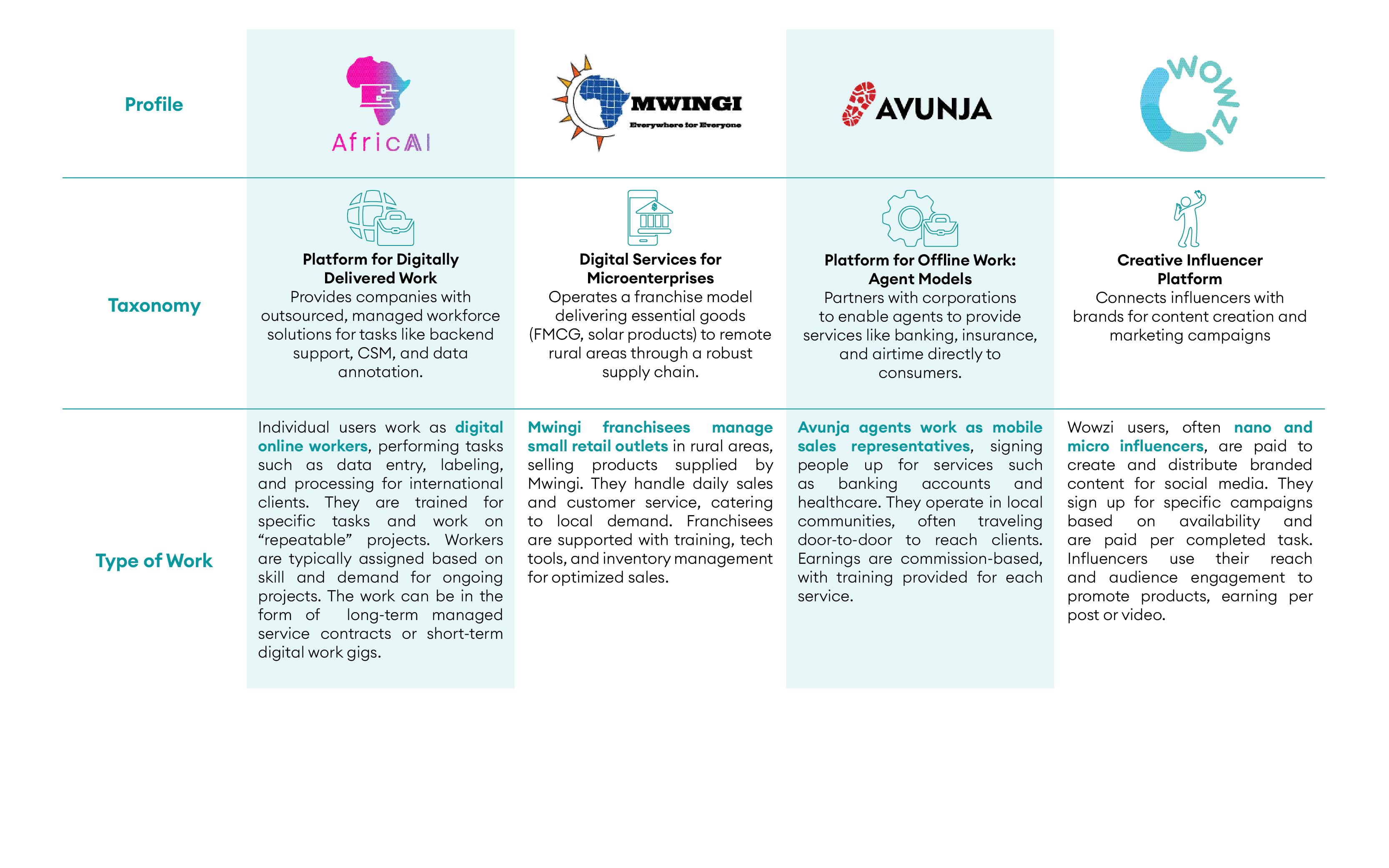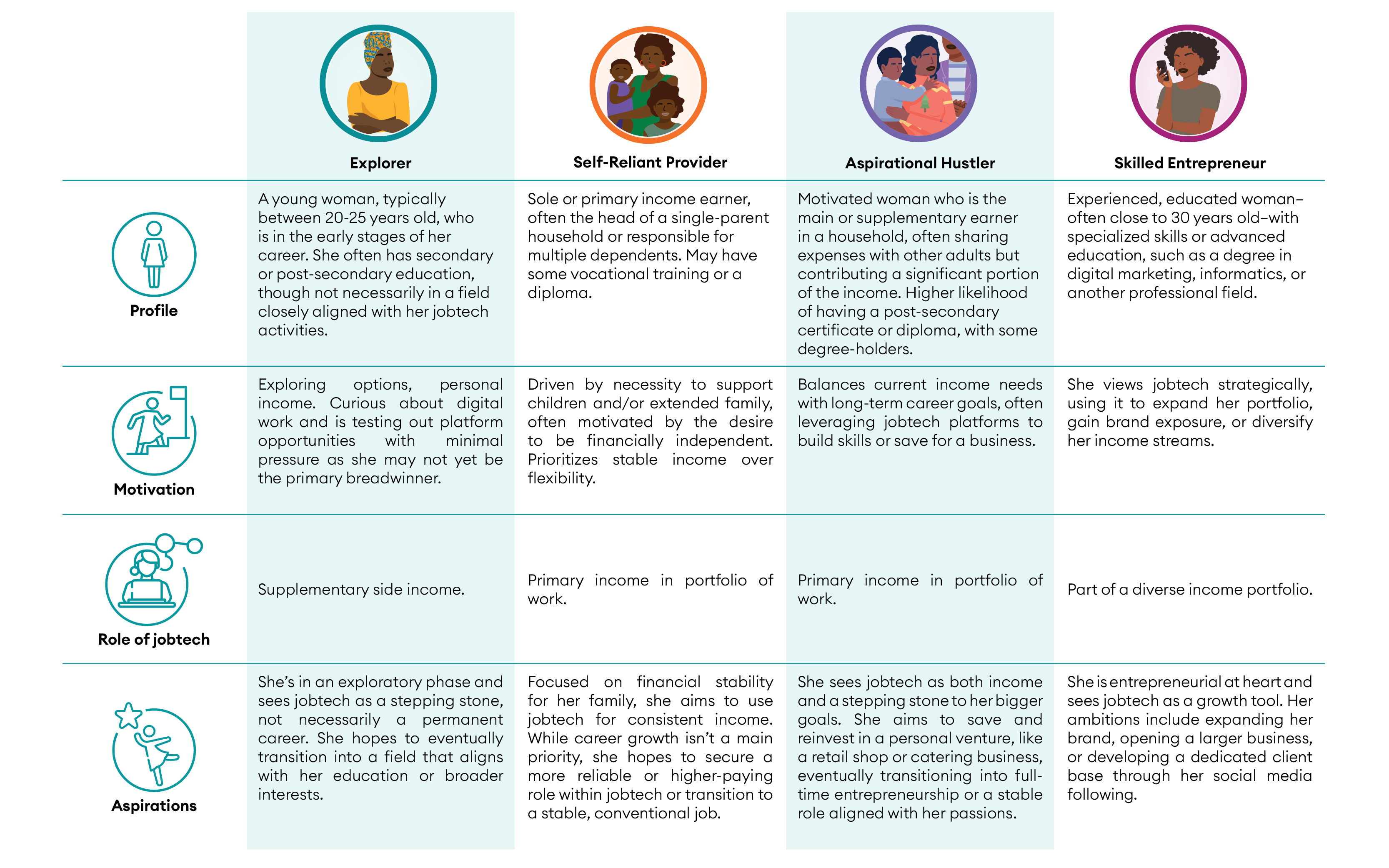By Jacob Winiecki
Meet Mary, a single mother in Nairobi, Kenya, who discovered Africa AI during a challenging period when regular work in her field seemed out of reach. As an accountant by training, the closure of her firm during COVID-19 left her searching for alternative ways to support her 5-year-old son. At Africa AI, she now works on digital transcription and data labeling projects. Despite the challenges of inconsistent work in her primary field of formal education, Mary has been able to turn jobtech work into a lifeline for her family. As she puts it: “I am doing this work for the sake of my child. If I quit right now, I wouldn’t be able to find another accounting job anywhere else.”
Jobtech platforms play different roles in people’s livelihoods – for some, they provide immediate financial relief, while for others, they serve as a stepping stone toward achieving long-term aspirations. However, to better understand and support women, we need to understand the different types of women who use jobtech platforms. Our research with four jobtech startups in Kenya reveals four distinct personas that illustrate how women engage with digital platforms for work, the challenges they face, and the opportunities these platforms create. This research sought to explore how jobtech platforms are impacting the lives of low-income women. Through 32 in-depth interviews conducted across four regions of Kenya, we captured the experiences of women aged 21-35 from diverse educational backgrounds, family structures, and technical skills. The study focused on uncovering the role these platforms play in women’s livelihoods, their motivations for joining, and their experiences earning through jobtech platforms. This research offers insights into how jobtech fits into broader income-generating strategies and how it can evolve to better support women’s lives and aspirations.
Our research included four jobtech platforms offering diverse earning opportunities for women. Africa AI provides managed digital work, offering consistent pay during active contracts. Avunja enables women to earn commissions by selling products like banking and insurance services. Mwingi empowers women as rural retail franchisees, earning through sales profits and a base retainer. And Wowzi connects influencers with brands, with earnings varying by follower reach and campaign engagement.

We created four personas representing the women we interviewed and their journeys with jobtech platforms. Personas are a powerful tool that distills complex research insights into relatable archetypes, making it easier to understand and address the diverse needs of users. Our hope is that these personas can help stakeholders, including jobtech platforms, funders, and researchers, empathize with the unique challenges and motivations of different women user groups. Each of the following personas reflects a specific combination of aspirations, barriers, and opportunities, offering a lens to view how women are motivated to join and navigate jobtech platform work in the context of their broader lives and goals. It’s important to note that these personas are based on initial research in Kenya and may not represent all users across all jobtech platforms or markets, but they provide valuable insights for stakeholders designing solutions for this sector.

Through our research, we identified four distinct personas that reflect the diverse ways women engage with jobtech platforms in Kenya. First, the Explorer is often younger and in the early stages of her career, using jobtech to test her options and gain some paid work experience while managing minimal financial pressure. For instance, Claire, a nano-influencer on Wowzi, uses the platform to earn a small amount of side income, enough to pay for a few essential household bills, while she explores other freelance opportunities and plans to pursue a degree in HR.
The Self-Reliant Provider, on the other hand, shoulders the responsibility of being the primary breadwinner, leveraging jobtech to meet her household’s financial needs and appreciating its flexibility to balance caregiving or other responsibilities. Mary, for instance, works on Africa AI’s transcription projects to support her child, relying on the platform’s income to cover essential needs. As she puts it, “The income here is slightly higher than what I was making in accounting, as long as I am on an active contract and working regularly.” While the Explorer focuses on discovery and testing or building new skills, the Self-Reliant Provider has to prioritize stability and consistent earnings to support her dependents.
The Aspirational Hustler combines her jobtech work with entrepreneurial ventures or other educational goals, using these platforms as a stepping stone toward achieving her ambitions. For example, Phoebe, an Avunja user, balances platform work with managing her fruit parlour and catering business, focusing on growing her entrepreneurial ventures into larger-scale events and equipment rentals. In contrast to the Aspirational Hustler’s forward-looking goals, the Self-Reliant Provider’s focus is more immediate, addressing pressing financial needs.
And lastly, the Skilled Entrepreneur is highly proficient and treats jobtech platforms as a way to scale her existing business or professional expertise. Julia, a seasoned content producer on Wowzi, uses the platform to negotiate higher rates with major brands while also running her own video production business and employing six people to grow her work. Unlike the Explorer, who is just starting out, the Skilled Entrepreneur uses jobtech as a strategic tool to grow her established career or businesses. Across all personas, access to affordable internet, reliable devices, and consistent work emerged as critical enablers, with gaps in these areas significantly impacting women’s ability to succeed on jobtech platforms.
Understanding these personas is not just about categorizing users – it’s about action. Jobtech platforms can use these insights to refine their offerings so they meet the unique needs of women across different life stages and aspirations. For example, platforms targeting Explorers might focus on low-barrier entry points and skill-building opportunities to get more women in the door to test jobtech as a way to earn. Platforms catering to Skilled Entrepreneurs could offer more advanced tools and networking support to help them scale their businesses. Similarly, targeted engagement strategies might resonate more with Self-Reliant Providers who value consistent income and stability or Aspirational Hustlers who may be attracted to platforms that blend flexibility with upskilling. These personas can also help platforms design strategies that better reach and support lower-income profiles by addressing barriers such as access, onboarding, training, and the predictability of work opportunities.
This research provides a nuanced understanding of how jobtech platforms support women at different life stages and with varying income needs and priorities. Our hope is that this research encourages funders and investors to deepen their understanding of the users they are targeting and identify which types of platforms offer the greatest value for those groups. At the same time, we hope it inspires further research into gender-specific barriers and opportunities to actively engage and empower women in the jobtech ecosystem. Moving forward, we plan to expand our research to cover additional regions, jobtech platform models, sectors, and evolving user needs. Stay tuned for more research in early 2025 as we continue to explore how jobtech platforms can better support and empower women across diverse regions and economic contexts.

0 Comments